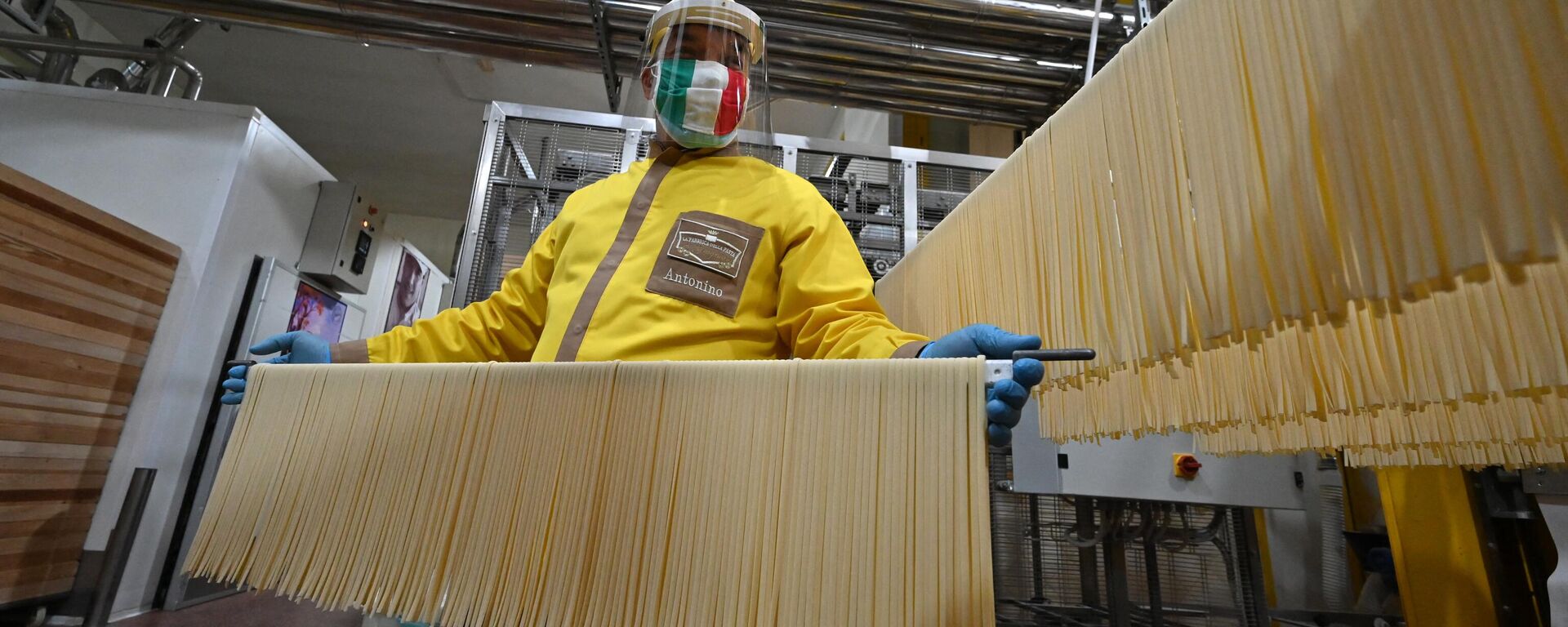https://sputnikglobe.com/20230702/italian-families-cut-on-food-amid-growing-prices-1111628471.html
Italian Families Cut on Food Amid Growing Prices
Italian Families Cut on Food Amid Growing Prices
Sputnik International
Households in Italy grapple declining living standards due to inflation.
2023-07-02T19:44+0000
2023-07-02T19:44+0000
2023-09-01T13:16+0000
world
italy
economy
economic crisis
inflation
https://cdn1.img.sputnikglobe.com/img/07e6/09/10/1100854758_0:85:3071:1813_1920x0_80_0_0_dbfa56377cff3dc766627ee0566bdd7e.jpg
Italian households are reducing their food spending due to soaring inflation, according to the General Confederation of Italian Industry (Confindustria). The report reveals a significant decline in household grocery expenses, with a 3.7% drop in 2022 and an alarming 8.7% decline in the fourth quarter of 2022 compared to the first quarter of 2021.In addition, a report by the National Consumer Union (UNC) in May shows that 35.1% of Italian households experienced declining living standards over the past year, compared to 30.5% in 2021.The UNC study highlights that for families with two children, the inflation rate of 7.7% as of May would result in an additional €2,306 ($2,515) in annual bills. Out of this amount, €1,015 would be allocated to food and beverages, while €1,062 would cover other essential products in their consumer basket.Massimiliano Donna, the head of the National Consumer Union (UNC), called the report "alarming," and further noted that “Italians are on a forced diet due to skyrocketing inflation.”Donna points out that this situation not only affects individuals but also has serious adverse effects on Italy's economic growth. With consumption representing 60% of GDP, if Italians are unable to make purchases, it leads to decreased sales for merchants and reduced production for businesses.The UNC had previously observed a trend of reduced food consumption in Italy during the pandemic, with purchases declining by 4.4% in January 2023 compared to the previous year and by 6.3% compared to the same month in 2021. This trend highlights the growing challenges Italian families face in maintaining their food consumption levels.According to preliminary estimates by Instituto Nazionale di Statistica (ISTAT), Italy's inflation rate slowed in June 2023. The consumer price index for the whole nation (NIC) remained unchanged compared to the previous month but increased by 6.4% annually, lower than the 7.6% recorded in May.However, there was still an upward contribution to the inflation rate from the prices of unprocessed food. The core inflation rate, excluding energy and unprocessed food, stood at 5.6%.This suggests that while there was a slowdown in inflation, prices of groceries and unprocessed food continued to increase, though at a slightly lower rate than the previous month.These findings shed light on the causes and effects of the economic situation in Italy. The combination of soaring inflation, particularly in energy prices, and increased costs of essential goods and services has placed a significant financial burden on Italian households. This has led to reduced food spending, impacting both individuals and the overall economy.
https://sputnikglobe.com/20230505/no-shells-no-pasta-italy-faces-food-and-ammo-troubles-amid-ukrainian-crisis-1110127096.html
italy
Sputnik International
feedback@sputniknews.com
+74956456601
MIA „Rossiya Segodnya“
2023
Chimauchem Nwosu
https://cdn1.img.sputnikglobe.com/img/07e7/09/01/1113046371_0:99:1536:1635_100x100_80_0_0_9c5c627283eca931c39fe4852bbb301c.jpg
Chimauchem Nwosu
https://cdn1.img.sputnikglobe.com/img/07e7/09/01/1113046371_0:99:1536:1635_100x100_80_0_0_9c5c627283eca931c39fe4852bbb301c.jpg
News
en_EN
Sputnik International
feedback@sputniknews.com
+74956456601
MIA „Rossiya Segodnya“
Sputnik International
feedback@sputniknews.com
+74956456601
MIA „Rossiya Segodnya“
Chimauchem Nwosu
https://cdn1.img.sputnikglobe.com/img/07e7/09/01/1113046371_0:99:1536:1635_100x100_80_0_0_9c5c627283eca931c39fe4852bbb301c.jpg
households in italy, inflation, declining living standards, general confederation of italian industry, confindustria, national consumer union, italian households, inflation rate, massimiliano donna, italy's economic growth, reduced food consumption, italian families, instituto nazionale di statistica, istat, italy's inflation rate, consumer price index, economic situation in italy
households in italy, inflation, declining living standards, general confederation of italian industry, confindustria, national consumer union, italian households, inflation rate, massimiliano donna, italy's economic growth, reduced food consumption, italian families, instituto nazionale di statistica, istat, italy's inflation rate, consumer price index, economic situation in italy
Italian Families Cut on Food Amid Growing Prices
19:44 GMT 02.07.2023 (Updated: 13:16 GMT 01.09.2023) Households in Italy grapple declining living standards due to inflation, which has been plaguing Europe since it introduced sanctions against Russia last year.
Italian households are reducing their food spending due to soaring inflation, according to the General Confederation of Italian Industry (
Confindustria). The report reveals a significant decline in household grocery expenses, with a 3.7% drop in 2022 and an alarming 8.7% decline in the fourth quarter of 2022 compared to the first quarter of 2021.
"This has become a burden on overall consumption, given that spending on food accounts for 14% of all expenses, second only to spending on housing, water, and energy (23%)," according to Confindustria.
In addition, a report by the National Consumer Union (UNC) in May shows that 35.1% of Italian households experienced declining living standards over the past year, compared to 30.5% in 2021.
The UNC study highlights that for families with two children, the inflation rate of 7.7% as of May would result in an additional €2,306 ($2,515) in annual bills. Out of this amount, €1,015 would be allocated to food and beverages, while €1,062 would cover other essential products in their consumer basket.
Massimiliano Donna, the head of the National Consumer Union (UNC), called the report "alarming," and further noted that “Italians are on a forced diet due to skyrocketing inflation.”
Donna points out that this situation not only affects individuals but also has serious adverse effects on Italy's economic growth. With consumption representing 60% of GDP, if Italians are unable to make purchases, it leads to decreased sales for merchants and reduced production for businesses.
The UNC had previously observed a trend of reduced food consumption in Italy during the pandemic, with purchases declining by 4.4% in January 2023 compared to the previous year and by 6.3% compared to the same month in 2021. This trend highlights the growing challenges Italian families face in maintaining their food consumption levels.
According to
preliminary estimates by
Instituto Nazionale di Statistica (ISTAT), Italy's inflation rate slowed in June 2023. The consumer price index for the whole nation (NIC) remained unchanged compared to the previous month but increased by 6.4% annually, lower than the 7.6% recorded in May.
"The data regarding those who consider their situation as stable could not be necessarily viewed in a positive light. In general, all those who could hardly make ends meet both in 2021 and 2022 fall under this definition. So there is no reason to be happy," Donna added.
However, there was still an upward contribution to the inflation rate from the prices of unprocessed food. The core inflation rate, excluding energy and unprocessed food, stood at 5.6%.
This suggests that while there was a slowdown in inflation, prices of groceries and unprocessed food continued to increase, though at a slightly lower rate than the previous month.
These findings shed light on the causes and effects of the economic situation in Italy. The combination of soaring inflation, particularly in energy prices, and increased costs of essential goods and services has placed a significant financial burden on Italian households. This has led to reduced food spending, impacting both individuals and the overall economy.




